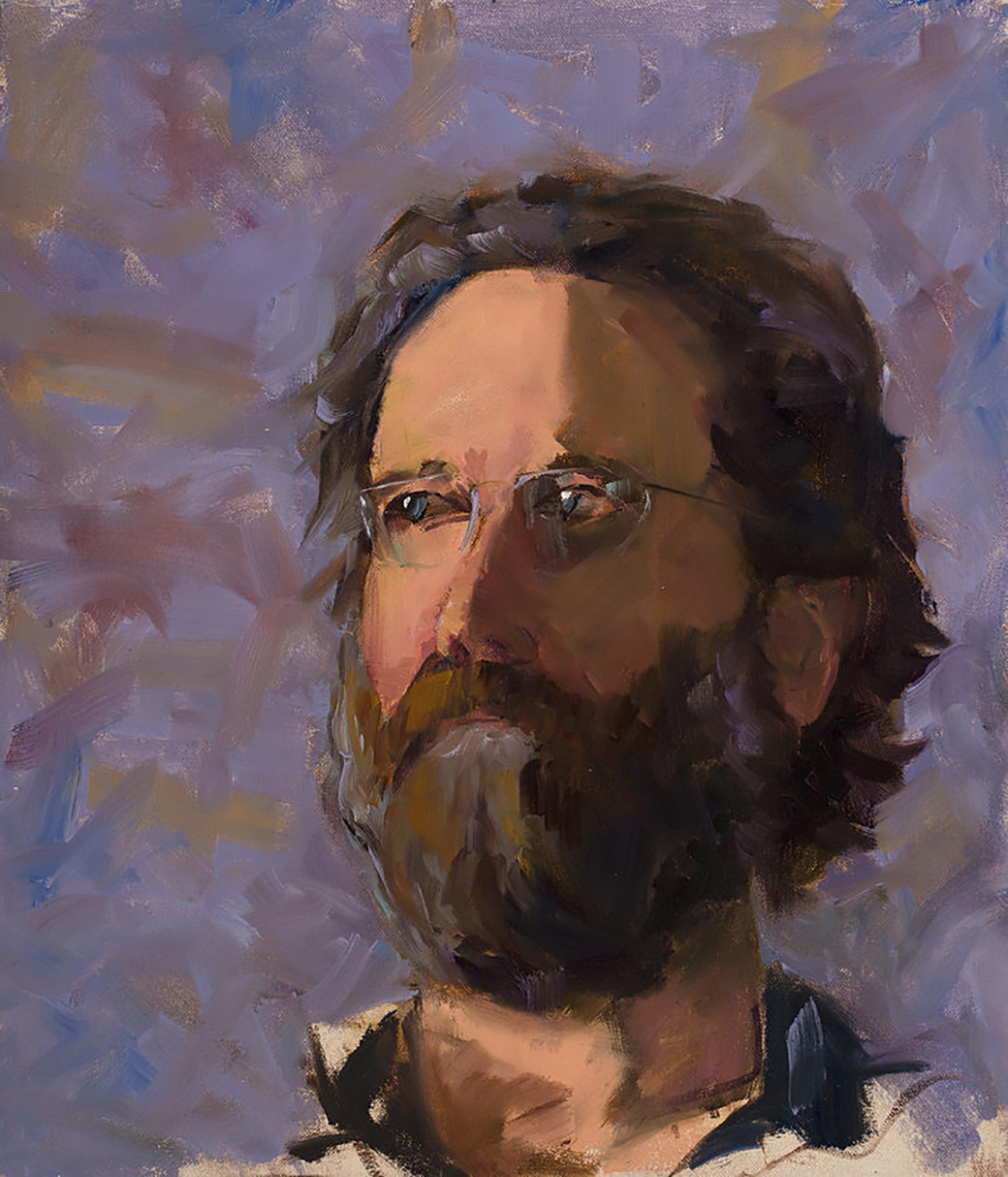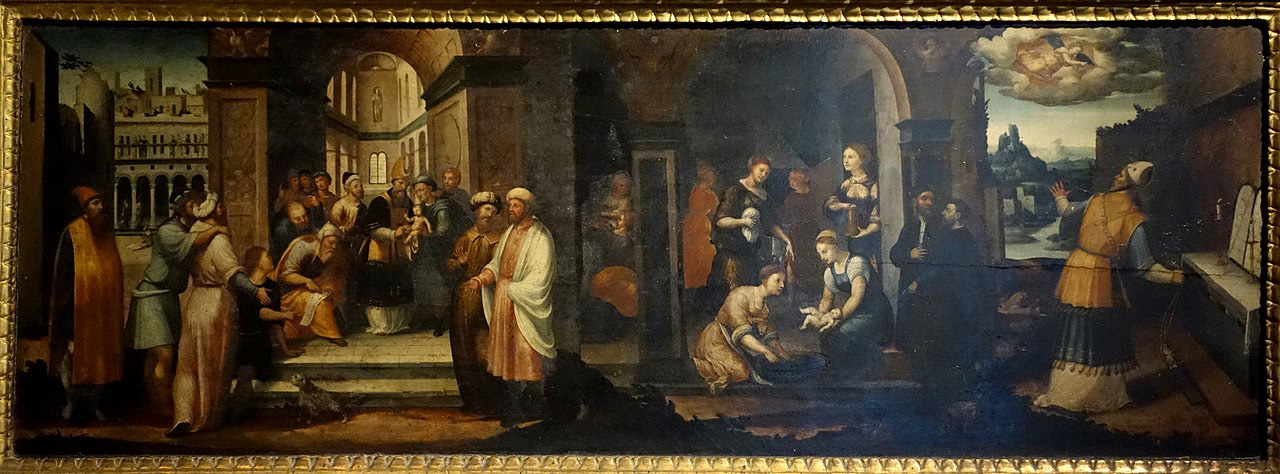Wednesday in the 4th Week of Advent: Malachi 3:1-4, 23-24, Luke 1:57-66.
At Penn State University where I attended college, a grand, elm-lined pedestrian walkway called Pattee Mall leads from College Ave all the way up to the library. Buildings holding classrooms line the 0.3-mile stretch, and it is after one of these — the particularly nondescript Willard Building — that the infamous Willard Preacher was named. This bedraggled fellow would preach a distinct brand of fire-and-brimstone gospel to all the students streaming by and, more often than not, a few philosophy types (or, alternatively, frat boys trying to outdo one another in offensiveness) could be found shouting back and forth questions and arguments with the Willard Preacher. I always thought of him as a type of prophet. I recall walking away from him several times on my way to class with a bit of unease as if I should be lingering to hear an important message. I remember encountering the poor guy at the bus stop one time thinking he was a homeless beggar until I recognized his profile and the proud eyes behind his dirty long hair. It was odd to have this quiet moment next to someone who always seemed to be at the center of a maelstrom of noise.

I thought of the Willard Preacher when I read today’s readings, probably because I recognized that same sense of something important descending on the neighbors of Zechariah and Elizabeth. We read that “fear came upon all their neighbors” as his tongue was loosed upon the naming of John the Baptist. Something new came into the family — the name John — but the loosening of Zechariah’s mute tongue spoke of greater portents. Something was happening and they needed to pay attention.
In the first reading, the prophet Malachi lays out more details about these great things manifesting in the house of Zachariah and Elizabeth. In hindsight, we can see how Malachai’s words directly relate to John and Jesus: “Lo, I am sending my messenger to prepare the way before me.” We have examined several times this Advent how John is “the voice crying out in the wilderness” foreseen by Isaiah. Even so, it’s worth recognizing how unique it is to foresee another prophet in addition to the Savior. You’d think that important prophecy would be mostly concerned with the Messiah; everything else is irrelevant. But it’s not irrelevant: God chooses to share with Malachi this vision, “Lo, I will send you Elijah, the prophet, Before the day of the LORD comes.” Elijah, one of the greatest of the Jewish prophets, who was taken up to heaven bodily on a flaming chariot, is promised to return to earth before the Messiah comes, specifically in order to “prepare the way” for Him. As we heard this Advent, Jesus professes that John is, in fact, the promised Elijah. The Messiah and this final prophet, this returned Elijah, are inseparably linked. It’s an important way for God to signal the importance of His Son and at the same time, it’s the action of His Son’s entrance into humanity that blesses the entire line of God’s prophets that came before Him, making them more important as a consequence.
But Zachariah and Elizabeth’s neighbors didn’t have the advantage of hindsight that all Christians do. They had the rich tradition of the Torah and the prophets, though. And as they considered what Zechariah’s freeing from being mute meant at the precise moment that his son, this new John, was made part of the Jewish tribe at his circumcision and name-giving day, they had this rich tradition to mine. They would have wondered what the opening up of a voice, a new voice, would have meant when it happens in miraculous circumstances. The symbolism was clear: it was as if nothing the respected priest Zachariah had to say was important until the announcement of his son’s arrival to the Chosen People. By extension, the entire tradition held its breath and its tongue, silent, until the announcement “John is his name” was inscribed. Zechariah has written the first line of a new book of prophecy. With the words of Isaiah, Jeremiah, Malachi and many others resounding in their heads, the people would then hear that Zechariah’s first words in many months are a great blessing to God after John is proclaimed. It is no wonder that “fear came upon all their neighbors and all these matters were discussed throughout the hill country of Judea. All who heard these things took them to heart, saying, ‘What, then, will this child be?’ For surely the hand of the Lord was with him.”

God planted the seeds of this sacred fear and wonder several millennia earlier. How they must have marveled with the sense of something of ultimate importance hanging in the very air around them! The Holy Spirit was active in the world, Elijah was alive again in the world, and God Himself was about to make His entrance into our mortal plane. Spiritual antennae were quivering, to be sure.
I’d like to finish this short reflection with a look at Malachi’s description of Christ. The Word of God describes what His own work on earth will be: “he is like the refiner’s fire, or like the fuller’s lye. He will sit refining and purifying silver, and he will purify the sons of Levi, Refining them like gold or like silver that they may offer due sacrifice to the LORD.” We must never forget this message from our Savior. He is the worker, the hand that refines the impure material and creates something that will be suitable to give glory to the Father. This orders not just our theology but our philosophy of self. First, Christ comes not just to wave a magic wand of salvation but to work with a specific raw material to refine it for His Father. Second, we are that raw, impure ore, waiting to be refined. This means we should expect to change over the course of our lives. This means we need to look to Christ our Savior to change us, not to try to change ourselves by our own will and plans. And, this means that our end goal is to offer pure, “due” sacrifice to the Lord. Christ will teach us that the acceptable sacrifice to the Lord is our own heart, our will, our entire person. Third, we understand that Christ is doing this work not for His own glory but for the glory of the Father, and thereby reveals the endless cycling of love between the Father, Son, and us as crucial elements in that love.
What a theologically rich few lines of prophecy about the Messiah!
And how lovely that we see this cycle of refinement for the glory of God active within Zachariah. God uses him as an example of how we must silence our own self and will while God does the work of refining our spirit — with our acceptance being paramount. Then, we are able to properly give glory to God. This cycle of love we see active in Zechariah is incomplete and imperfect, however, because Christ has yet to be born and make His great sacrifice to conquer death, which will carry Zechariah into the Kingdom alongside Him to glory the Father for eternity. But that doesn’t mean Zechariah’s glory-giving to God is imperfect, as we’ll see tomorrow!

So, let us end these last few days of Advent with these great portents gripping us as they did the Jews at the naming of John. Let’s make sure our anticipation of Christ is configured appropriately: waiting for His help in refining our spirit to make us acceptable to the Father.